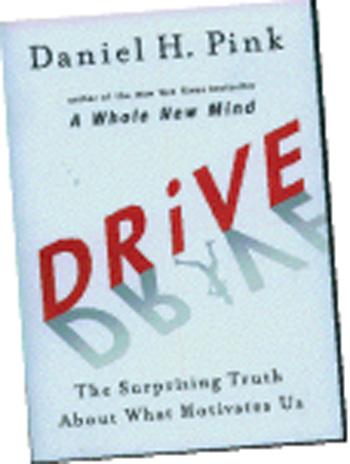You are a record-holder. Nobody else in the entire building can say they won a game of computer solitaire faster than you did. And you accomplished it through hours of practice and more losses than you’d care to admit. You’re
You are a record-holder.
Nobody else in the entire building can say they won a game of computer solitaire faster than you did. And you accomplished it through hours of practice and more losses than you’d care to admit.
You’re good. You’re the envy of your officemates.
If only your boss knew…
But what if your boss started to pay you for your solitaire prowess? What if your salary was based on being number one at computer cards? In the new book “Drive: The Surprising Truth About What Motivates Us” by Daniel H. Pink, you’ll see why you never want to find out.
For decades, researchers have known that humans act on two main drives: biological (food, water, sex) and environmental (rewards from outside sources). Obviously, your solitaire habit doesn’t feed you, hydrate you, or help you procreate. You might get accolades now, but what got you started on the game in the first place?
Studies have shown that there’s another reason, a fragile “third drive”: we do things that have no intrinsic value just for the joy of doing them. That third drive is both a problem and a solution in business.
Let’s say that your boss decides to pay you for playing solitaire, since you’re so good at it. You’d be a solitaire-playing fool for awhile but (as you can probably guess) the fun won’t last. When play becomes work, it ceases to be the third drive. Even if your boss ties your score to a monetary reward, the game won’t be enjoyable for long. Solitaire becomes a chore.
Rewards, as it turns out, can backfire. Studies show that when people are offered compensation to complete a task, they got the reward quickly but long-term results fell off. Thus, Pink says, “if-then” rewards (IF you do this, THEN you get that) can harm productivity. Punishment makes things even worse.
So what’s your boss to do?
Humans need autonomy. Allowing you leeway in your workday would make you more focused on your job. Releasing your creativity would mean better on-the-job satisfaction. Managing without managing and letting you set your own goals would make you feel more in control. And giving you a chance to get into “flow” would make you more productive.
Although it’ll be a challenge for many workplaces to embrace what’s inside “Drive”, and though author Daniel H. Pink admits that autonomy won’t be advantageous to most task-driven businesses, this is the kind of book that every business owner should read.
Surprisingly, Pink shows that “management” may go the way of rotary phones and mimeograph machines in the office. Of course, there are exceptions to every rule, but Pink says future jobs (those that rely on creativity more than physical labor) won’t need to be “managed” and that allowing employees to do non-work at work actually makes them work harder.
While I wouldn’t call this book a casual read, for businesspeople, it’s a must-read. If you want your business to be around in the future, what’s in “Drive” is in the cards.
• The Bookworm is Terri Schlichenmeyer. Terri has been reading since she was 3 years old and she never goes anywhere without a book.


